
Robert Dennis Crumb is an American cartoonist and musician who often signs his work R. Crumb. His work displays a nostalgia for American folk culture of the late 19th and early 20th centuries, and satire of contemporary American culture.
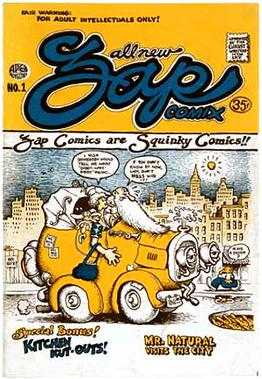
Underground comix are small press or self-published comic books that are often socially relevant or satirical in nature. They differ from mainstream comics in depicting content forbidden to mainstream publications by the Comics Code Authority, including explicit drug use, sexuality, and violence. They were most popular in the United States in the late 1960s and 1970s, and in the United Kingdom in the 1970s.
The Print Mint, Inc. was a major publisher and distributor of underground comix based in the San Francisco Bay Area during the genre's late 1960s-early 1970s heyday. Starting as a retailer of psychedelic posters, the Print Mint soon evolved into a publisher, printer, and distributor. It was "ground zero" for the psychedelic poster. The Print Mint was originally owned by poet Don Schenker and his wife Alice, who later partnered in the business with Bob and Peggy Rita.
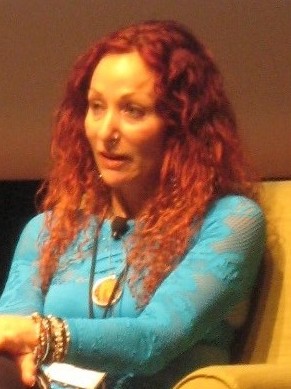
Aline Kominsky-Crumb was an American underground comics artist. Kominsky-Crumb's work, which is almost exclusively autobiographical, is known for its unvarnished, confessional nature. In 2016, Comics Alliance listed Kominsky-Crumb as one of twelve women cartoonists deserving of lifetime achievement recognition. She was married to cartoonist Robert Crumb, with whom she frequently collaborated. Their daughter, Sophie Crumb, is also a cartoonist.

Kitchen Sink Press was a comic book publishing company founded by Denis Kitchen in 1970. Kitchen Sink Press was a pioneering publisher of underground comics, and was also responsible for numerous republications of classic comic strips in hardcover and softcover volumes. One of their best-known products was the first full reprint of Will Eisner's The Spirit—first in magazine format, then in standard comic book format. The company closed in 1999.

Denis Kitchen is an American underground cartoonist, publisher, author, agent, and the founder of the Comic Book Legal Defense Fund.

Jay Patrick Lynch was an American cartoonist who played a key role in the underground comix movement with his Bijou Funnies and other titles. He is best known for his comic strip Nard n' Pat and the running gag Um tut sut. His work is sometimes signed Jayzey Lynch. Lynch was the main writer for Bazooka Joe comics from 1967 to 1990; he contributed to Mad, and in the 2000s expanded into the children's book field.
Jay Kinney is an American author, editor, and former underground cartoonist. Kinney has been noted for "adding new dimensions to the political comic" in the underground comix press of the 1970s and '80s.

Mr. Natural is a comic book character created and drawn by 1960s counterculture and underground comix artist Robert Crumb. First appearing in Yarrowstalks (1967), the character gained a following during the emergence of underground comix in the 1960s and 1970s, and has been extensively merchandised in various products.
Donald Michael Dohler was an American film director known for making low-budget science fiction and horror films, as well as his work in underground comix and publishing.
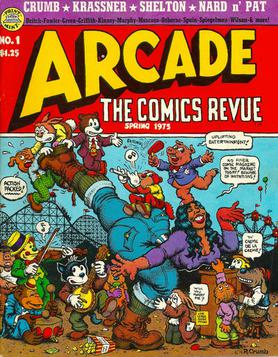
Arcade: The Comics Revue is a magazine-sized comics anthology created and edited by cartoonists Art Spiegelman and Bill Griffith to showcase underground comix. Published quarterly by the Print Mint, it ran for seven issues between 1975 and 1976. Arriving late in the underground era, Arcade "was conceived as a 'comics magazine for adults' that would showcase the 'best of the old and the best of the new comics'". Many observers credit it with paving the way for the Spiegelman-edited anthology Raw, the flagship publication of the 1980s alternative comics movement.
Mervyn "Skip" Williamson was an American underground cartoonist and central figure in the underground comix movement. Williamson's art was published in the National Lampoon, High Times, the Realist, the Industrial Worker, the Chicago Seed, Encyclopædia Britannica and others. His best-known character is Snappy Sammy Smoot.
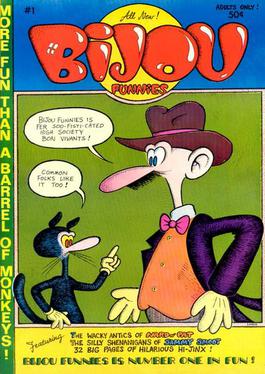
Bijou Funnies was an American underground comix magazine which published eight issues between 1968 and 1973. Edited by Chicago-based cartoonist Jay Lynch, Bijou Funnies featured strong work by the core group of Lynch, Skip Williamson, Robert Crumb, and Jay Kinney, as well as Art Spiegelman, Gilbert Shelton, Justin Green, and Kim Deitch. Bijou Funnies was heavily influenced by Mad magazine, and, along with Zap Comix, is considered one of the titles to launch the underground comix movement.
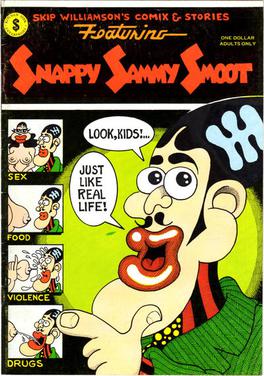
Snappy Sammy Smoot is an American underground comix character created by Skip Williamson in 1968. A counterculture Candide who never loses his innocence, Snappy Sammy Smoot appeared in his own strips in a number of comix titles, most notably Bijou Funnies, Comix Book, and Blab!. Cultural critic David Manning White wrote about the strip, "But what is. .. interesting about 'Snappy Sammy Smoot' is that it manages to be politically radical at the same time it is satirical and funny", and that it is "one of more highly stylized in the field".

Donald Richard Donahue was a comic book publisher, operating under the name Apex Novelties, one of the instigators of the underground comix movement in the 1960s.
Gary Edson Arlington was an American retailer, artist, editor, and publisher, who became a key figure in the underground comix movement of the 1960s and 1970s. As owner of one of America's first comic book stores, the San Francisco Comic Book Company, located in San Francisco's Mission District, Arlington's establishment became a focal point for the Bay Area's underground artists. He published comics under the name San Francisco Comic Book Company, as well as publishing and distributing comics under the name Eric Fromm. Cartoonist Robert Crumb has noted, "Gary made a cultural contribution in San Francisco in the late 1960s, through the '70s, '80s & '90s that was more significant than he realizes."
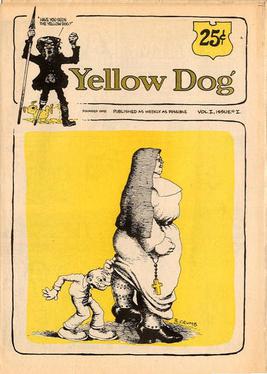
Yellow Dog was an underground comix newspaper and later comic book published by the Print Mint in Berkeley, California. It published 22 issues from 1968 to 1973, featuring many of the period's most notable underground cartoonists, including Robert Crumb, Joel Beck, Robert Williams, Rick Griffin, Greg Irons, and Trina Robbins. Other frequent contributors included Andy Martin, Franz Cilensek, John Thompson, Buckwheat Florida, Jr., Jim Osborne, Ronald Lipking, and Hak Vogrin. The founding editor was Print Mint co-publisher Don Schencker.
William "Willy" Murphy was an American underground cartoonist and editor. Murphy's humor focused on hippies and the counterculture. His signature character was Arnold Peck the Human Wreck, "a mid-30s beanpole with wry observations about his own life and the community around him." Murphy's solo title was called Flamed-Out Funnies; in addition, he contributed to such seminal underground anthologies as Arcade, Bijou Funnies, and San Francisco Comic Book, as well as the National Lampoon.

Cartoonists Co-op Press was an underground comix publishing cooperative based in San Francisco that operated from 1973 to 1974. It was a self-publishing venture by cartoonists Kim Deitch, Bill Griffith, Jerry Lane, Jay Lynch, Willy Murphy, Diane Noomin, and Art Spiegelman. Cartoonist Justin Green's brother Keith acted as salesman/distributor, and the operation was run out of Griffith's apartment.
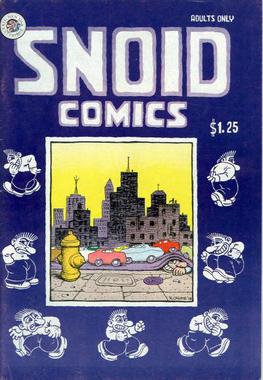
The Snoid, occasionally referred to as Mr. Snoid, is an American underground comix character created by Robert Crumb in the mid-1960s. A diminutive sex fiend and irritating presence, the Snoid often appears with other Crumb characters, particularly Angelfood McSpade, Mr. Natural, and Crumb's own self-caricature.














